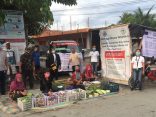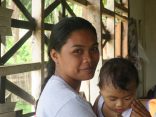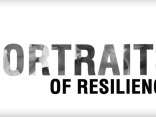by Llane Belle Salmorin
In photo: Mila Muyco, a 77 year-old widow, happily sitting on one of the mats she weaves for a living at the middle of her new house, built by her son-in-law and other members of the community through bayanihan.
“It does not matter if you are old, as long as you work hard to survive.”
Those were the words from Mila Muyco, a 77 year old widow from Barangay Batuan in San Dionisio, Iloilo. She faces each day in a positive light despite the hardships that the recent typhoon Yolanda has brought her life.
by Llane Belle Salmorin
In photo: Mila Muyco, a 77 year-old widow, happily sitting on one of the mats she weaves for a living at the middle of her new house, built by her son-in-law and other members of the community through bayanihan.
“It does not matter if you are old, as long as you work hard to survive.”
Those were the words from Mila Muyco, a 77 year old widow from Barangay Batuan in San Dionisio, Iloilo. She faces each day in a positive light despite the hardships that the recent typhoon Yolanda has brought her life. If the weather is tolerable enough, Aling Mila would devote her time to planting vegetables and root crops in the vacant land around her house; otherwise you would find her weaving a mat inside her newly constructed house.
Facing Challenges
I reached her house around noon under the sweltering heat of the sun, while she was busy entwining the dried leaves of the buri palm to produce a mat. Carrying her precious vegetables and root crops along with two finished mats, Aling Mila would tread the two-kilometer long dry and dusty road weekly to sell her goods at the market of nearby Bagacay.
She resolves to walk her way to the market because she does not have enough money to pay for her fare. Aling Mila considers days when motorcycle owners offer her a ride as lucky, saying that “If somebody I know sees me and offers me a ride, I will be lucky not to walk that far for that day.”
Two mats per week are sold, giving her PhP 300, which she uses to buy her immediate needs: rice, kerosene for her lamp, salt for her viand, and, if there is another peso to spare that week, tuyo (dried fish). If she doesn’t produce and/or sell enough items, Aling Mila resorts to eating sweet potato or cassava for her meal. Sometimes, she would also borrow rice from her neighbors, replacing it whenever she has the money.
Yolanda blew Aling Mila’s house down and destroyed her vegetables and plants, which was all that she had. She shared, “My grandson fetched me under the banana plant where I was hiding when the strong winds started to pound my house down. I was so scared that all I did was to sit there and pray.” They managed to crawl their way up to a hill, and from there slowly made it to the school where everybody else crowded to safety.
Nurturing Hopes
Aling Mila admits that it was not an easy task for her to recover from the effects of the typhoon, but the inner strength she has developed ever since becoming a widow early on in her marriage life made her ready to face challenges like these head on.
She was very thankful to qualify and be selected as a beneficiary of the shelter assistance. Shelter repair kits and cash support to rebuild damaged houses were distributed by ACCORD to the affected poor households with damaged houses, especially those with vulnerable members in the family, such as elderly, differently abled and pregnant women, for example .
Aling Mila received materials like corrugated sheets, plain sheets, specialized nails, and other housing tools. Aling Mila used the cash grant amounting to PhP 3,000 to purchase lumber and additional construction materials. Paying for a carpenter was not a problem because she has her neighbors and son-in-law, who have given her a hand in constructing her new house.
Despite her age and status, Aling Mila feels satisfied with her life, as she casually weaves her mat under her new roof, “I am very happy and grateful that I became one of ACCORD’s shelter recovery beneficiaries. I no longer have to worry every time the rains come, because I now have my home.”
ACCORD's interventions in San Dionisio, as well as in the municipalities of Estancia in Iloilo and La Paz in Leyte, have been made possible through the support of the European Union's Humanitarian Aid and Civil Protection Department (ECHO) and the Dutch Cooperating Aid Agencies (SHO).




